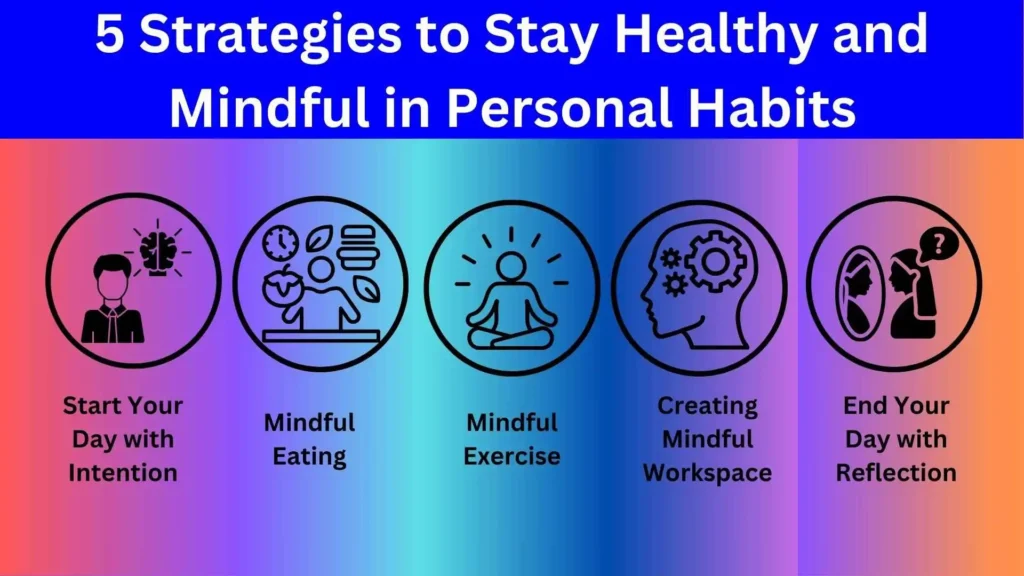We all have personal habits, whether we’re aware of them or not. Personal habits are the building blocks of our daily lives, influencing everything from our health and productivity to our happiness and success.
Everybody has their own personal habits; some are ingrained in us from a young age, while others are more recent. Some we genuinely enjoy, some we try to avoid.
While some habits benefit us, others may be detrimental if we are unaware of them. But what exactly are personal habits, and how can we stay healthy and mindful in these habits?
Table of Contents
What are Personal Habits?
Personal habits are routine behaviors we perform regularly, often without conscious thought. They are the actions we take every day that form our daily routines.
Our personal habits define who we are and contribute to our unique identities. As the saying goes, “We become what we repeatedly do.”
We all approach issues and challenges and live our lives uniquely, and our habits play an essential role in guiding us.
Personal habits can be divided into three categories:
- Healthy Habits
These include behaviors that promote physical, mental, and emotional wellbeing, such as regular exercise, sleep habits, healthy marriage habits, and healthy phone habits.
- Neutral Habits
These are routine actions that neither significantly harm nor benefit us, like checking the mail daily.
- Unhealthy Habits
These behaviors can negatively impact our health and wellbeing, such as smoking, excessive blinking habits, or chronic procrastination.
5 Strategies to Stay Healthy and Mindful in Personal Habits
With the following five effective strategies, you can stay healthy and mindful in personal habits.

1. Start Your Day with Intention
One of the most effective ways to cultivate mindfulness is to start your day with clear intentions. This powerful practice not only sets a positive tone for the day ahead but also keeps you mindful of your personal habits.
The intention is like a guiding star that directs your focus and energy. When you begin with a clear intention, you align your thoughts, actions, and priorities, paving the way for a more purposeful and fulfilling day.
Brenna Yovanoff says, “Intention is one of the most powerful forces there is. What you mean when you do a thing will always determine the outcome.”
By consciously setting an intention at the beginning of your day, you create a mental framework that shapes how you approach everything from work tasks to personal interactions and self-care routines.
It helps you cultivate mindfulness in your daily personal habits, encourages proactive decision-making, and fosters a sense of empowerment over your life. Remember, each morning is a new opportunity to align your actions with your aspirations and live purposefully.
How to Start Your Day with Intention
You can stay strong and healthy by starting your day with intention with the help of the following tips.
I. Set Aside Quiet Time
Begin your day with a few moments of silence or meditation. This allows you to center yourself and reflect on what matters most to you.
II. Reflect on Your Values
Consider what values you want to embody throughout the day, such as kindness, productivity, creativity, or gratitude.
III. Set Clear Goals
Outline specific goals or tasks you want to accomplish. This gives you a sense of purpose and motivates you to take focused action.
IV. Visualize Success
Picture yourself achieving your goals and visualize how you will navigate challenges with resilience and positivity.
V. Affirm Your Intentions
Repeat affirmations or mantras that resonate with your intentions for the day. This reinforces your mindset and encourages a positive outlook.
2. Mindful Eating
Eating mindfully means being completely present while you eat, noticing the flavor, texture, and aroma of your food, and acknowledging your body’s signals of hunger and fullness.
It’s about savoring each bite and appreciating the entire eating experience without distractions.
It enhances your relationship with food and promotes a more mindful approach to your overall lifestyle.
With the help of mindful eating, you can stay healthy and mindful in your personal habits. Because it can,
- Improve digestion
- Better weight management
- Reduce stress
- Promote a sense of calmness
- A healthy relationship with food.
How to Practice Mindful Eating
Practice mindful eating habits in the following ways.
- Eliminate Distractions: Press the off button on the television, tuck your phone away, and enjoy a quiet meal.
- Chew Thoroughly: Take the time to chew each bite thoroughly, which not only aids digestion but also allows you to savor the food.
- Engage Your Senses: Notice your food’s colors, smells, and textures. Enjoy the experience with all your senses.
- Eat Slowly: Take smaller bites and eat slowly, giving your body time to signal when it’s complete.
- Listen to Your Body: Listen to your body’s hunger and fullness cues. Eat until you’re full; once you’re full, stop eating.
3. Mindful Exercise
Mindful exercise enhances physical performance and deepens the mental benefits of both practices. Research shows that people who practice mindful exercise experience lower levels of anxiety and depression, greater stress resilience, and improved overall wellbeing.
Practicing mindfulness during exercise makes you more attuned to your body’s signals. This awareness helps you avoid overexertion and reduces the risk of injury.
Mindful exercise helps reduce stress by encouraging a state of relaxation and calm. It also improves concentration and mental clarity, allowing you to manage personal habits better.
A renowned mindfulness teacher, Thich Nhat Hanh, says, “The present moment is filled with joy and happiness. If you are attentive, you will see it,”
Steps to Incorporate Mindfulness into Exercise
The following steps will help you incorporate mindfulness into exercise and maintain healthy, mindful personal habits.
I. Setting Intentions
Before you begin your workout, take a moment to set an intention. This could be as simple as focusing on your breath or being aware of your movements.
II. Focusing on Breathing
Breathing is a fundamental aspect of both mindfulness and exercise. Pay attention to your breath as you move, noticing the rhythm and depth.
III. Paying Attention to Body Sensations
Tune in to your body’s sensations as you exercise. Notice the feel of your muscles working, your heart’s beat, and your breath’s flow.
IV. Being Present in the Moment
Mindfulness is all about being in the here and now. This practice can transform your exercise routine into a meditative experience, and you will become more mindful of your personal habits.
Some Mindful Exercise Practices
- Yoga
- Tai chi
- Walking meditation
- Mindful running
4. Creating Mindful Workspace
Establishing a conscious workspace is not only about aesthetics; it is about establishing an environment that promotes focus, decreases stress, and enhances productivity.
Incorporating mindfulness into your workspace is a good work habit. It means setting up an area that supports these principles, allowing you to be healthy and mindful in personal habits.
A mindful workspace helps eliminate distractions, allowing you to focus on tasks more clearly and keep you healthy and mindful in personal habits. By being present and engaged, you can accomplish more in less time.
A well-organized and serene workspace fosters creativity. When your mind isn’t cluttered, you can think more freely, be more mindful in daily tasks, and explore innovative solutions to problems.
Mindfulness Practices in Your Workspace
The following are some mindful practices in your workspace.
I. Meditation Breaks
Take short meditation breaks to clear your mind. Even a few minutes of deep breathing or guided meditation can significantly reduce tension and improve attention.
II. Breathing Exercises
Incorporate breathing exercises into your daily routine. Techniques like diaphragmatic breathing can help calm your nervous system and improve concentration.
5. End your Day with Reflection
Ending your day with reflection can significantly enhance mindfulness in personal habits. This practice helps in processing the day’s events and sets a positive tone for the next day.
As the renowned philosopher Socrates said, “An unexamined life is not worth living.”
Reflection is a powerful tool for personal growth and mindfulness. You can gain valuable insights into your habits and decision-making processes by taking a few moments each evening to consider your actions, thoughts, and emotions. This practice helps you to:
Gain clarity: Understand what went well and what didn’t during your day.
Learn from experiences: Identify lessons from both successes and mistakes.
Set intentions: Plan for a better tomorrow by setting positive intentions.
How to Practice Evening Reflection
Everyone wants to live a mindful life. Try the following tips for evening reflection, and you will always stay mindful and healthy in your personal habits.
I. Create a Quiet Space
Find a peaceful spot where you can sit comfortably without distractions.
II. Use a Journal
Writing down your thoughts can help clarify your reflections. Keep a journal by your bedside to jot down key points about your day.
III. Ask Reflective Questions
- What were the highlights of my day?
- What challenges did I face, and how did I handle them?
- What am I grateful for today?
- How did I contribute to others’ lives?
- What can I improve tomorrow?
IV. Practice Gratitude
Finally, express gratitude for at least three things. This technique can help you shift your attention from potential sources of stress to things that make you happy and fulfilled.
Importance of Personal Habits?
The importance of personal habits are:
Positive Effect of Good Personal Habits
- These habits are vital for maintaining physical health.
- These habits can improve mental health and emotional resilience.
- It can boost efficiency and effectiveness in personal and professional life.
Negative Effects of Bad Personal Habits
On the other hand, bad personal habits can have detrimental effects:
- Habits like smoking, excessive alcohol consumption, and poor diet can lead to serious health issues
- It can hinder personal and professional growth, leading to missed opportunities and increased stress.
- Negative habits can contribute to anxiety, depression, and overall mental fatigue.
Conclusion
Staying healthy and mindful of personal habits can profoundly impact your life. You can cultivate a sense of peace and clarity by starting your day with intention, practicing mindful eating, incorporating mindfulness into exercise, creating a mindful workspace, and ending your day with reflection. Begin with these strategies and watch as your overall wellbeing improves.
Remember, mindfulness is a journey, not a destination. Keep practicing; over time, you’ll find it easier to stay present and engaged in every aspect of your life.
FAQs
How can I stay mindful in stressful situations?
Take a few deep breaths in stressful situations to calm your mind and body. Focus on your breath or a specific sensory detail around you. This can help you stay centered and respond more thoughtfully rather than react impulsively.
How can I stay consistent with my mindfulness practices?
Staying consistent with mindfulness practices can be challenging. Try setting a regular time for your practices, starting with small steps and gradually building up. Find a routine that works for you, and make mindfulness a non-negotiable part of your day.




